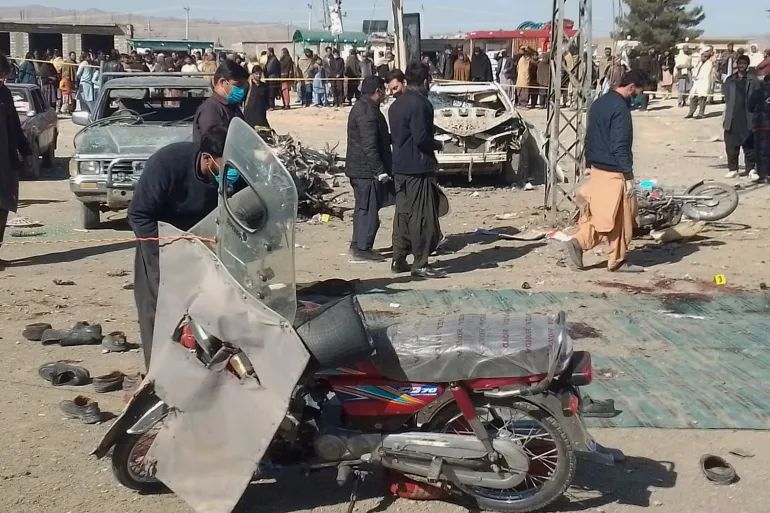Islamabad, Pakistan:- The eve of Pakistan’s 12th general elections is marred by a series of tragic events, casting a shadow over the electoral process. Two separate attacks targeting political offices in the Balochistan province have left at least 22 dead, raising concerns about the security landscape as the nation prepares to cast its votes.
Table of Contents
Attacks in Balochistan
In an unfortunate turn of events, violent attacks unfolded in the Balochistan province, targeting political offices and resulting in the loss of over 20 lives. Despite the grim circumstances, the Election Commission of Pakistan remains steadfast, affirming that voting will proceed in the affected Balochistan constituencies. The incidents prompt critical questions about the adequacy of security measures in place to safeguard the democratic process.
Opposition Under Siege in Pakistan
The prelude to the elections witnesses a significant crackdown on the opposition, particularly on the largest party led by former Prime Minister Imran Khan. With Khan behind bars and his party denied the use of its symbol, the cricket bat, concerns about the fairness of the electoral process intensify. Analysts raise questions about potential pre-poll rigging, alleging interference in the democratic exercise.
Security Vigilance
Pakistan’s caretaker Interior Minister, Gohar Ejaz, condemns the attacks and vows to establish law and order for the elections. Ejaz’s commitment to thwart attempts at disrupting the democratic process is evident in his assertion that “terrorists’ attack on innocent citizens is a very cowardly act.” The emphasis on preserving the sanctity of the electoral process signals the government’s determination to navigate the challenges posed by security threats.
Electoral Landscape Complexities
The absence of Imran Khan, a charismatic figure and former cricket star, as a contender introduces complexity to the electoral landscape. Khan’s sidelining shifts attention to a contest primarily between Nawaz Sharif, seeking a historic fourth term, and Bilawal Bhutto Zardari, a first-time candidate. The unfolding dynamics, coupled with the crackdown on the opposition, raise concerns about the level playing field necessary for a fair and democratic election.
Allegations of Pre-Poll Rigging
Accusations of pre-poll rigging add to the unease surrounding the electoral process. Analysts question the credibility of the vote as authorities crack down on Imran Khan and his aides. Both the military and the caretaker government deny suppressing the opposition, underscoring the delicate balance between maintaining security and ensuring an impartial democratic process.
Public Disillusionment
Bilawal Bhutto Zardari, center, during an election campaign rally in Karachi on February 5, 2024.[Fareed Khan/AP Photo]
As Pakistan’s diverse population, grappling with economic challenges and widespread poverty, prepares to cast their votes, a palpable sense of disillusionment emerges. Many young voters, representing a significant portion of the electorate, express frustration, feeling overlooked and unheard. The disenchantment among the youth, considered a catalyst for change, poses a challenge to the legitimacy of the electoral outcome.
Global Watch
A man weeps after identifying a body as his relative, who was killed in the Pashin district’s bomb blast, at a morgue in a hospital in Quetta [Arshad Butt/AP Photo]
The international community closely monitors the unfolding events in Pakistan, expressing concerns about political violence, opposition suppression, and the overall credibility of the electoral process. The outcome of these elections holds significance not only for Pakistan’s domestic stability but also for its standing on the global stage. International observers stress the importance of upholding democratic principles and ensuring a transparent electoral process.
In the face of these challenges, Pakistan finds itself at a critical juncture. The resilience of its democratic institutions, the ability to conduct free and fair elections, and the response to security threats will collectively shape the nation’s future trajectory. As Pakistanis prepare to exercise their democratic right, the world watches, hoping for a peaceful and democratic transition of power in this nuclear-armed South Asian nation.
Conclusion
In the face of tragic attacks, political crackdowns, and security concerns, Pakistan stands at a pivotal moment on the eve of its 12th general elections. The resilience of its democratic institutions, the ability to conduct fair polls, and the response to security threats will collectively determine the nation’s future. As the international community closely watches, the hope is for a peaceful and democratic transition of power in this critical South Asian nation.
